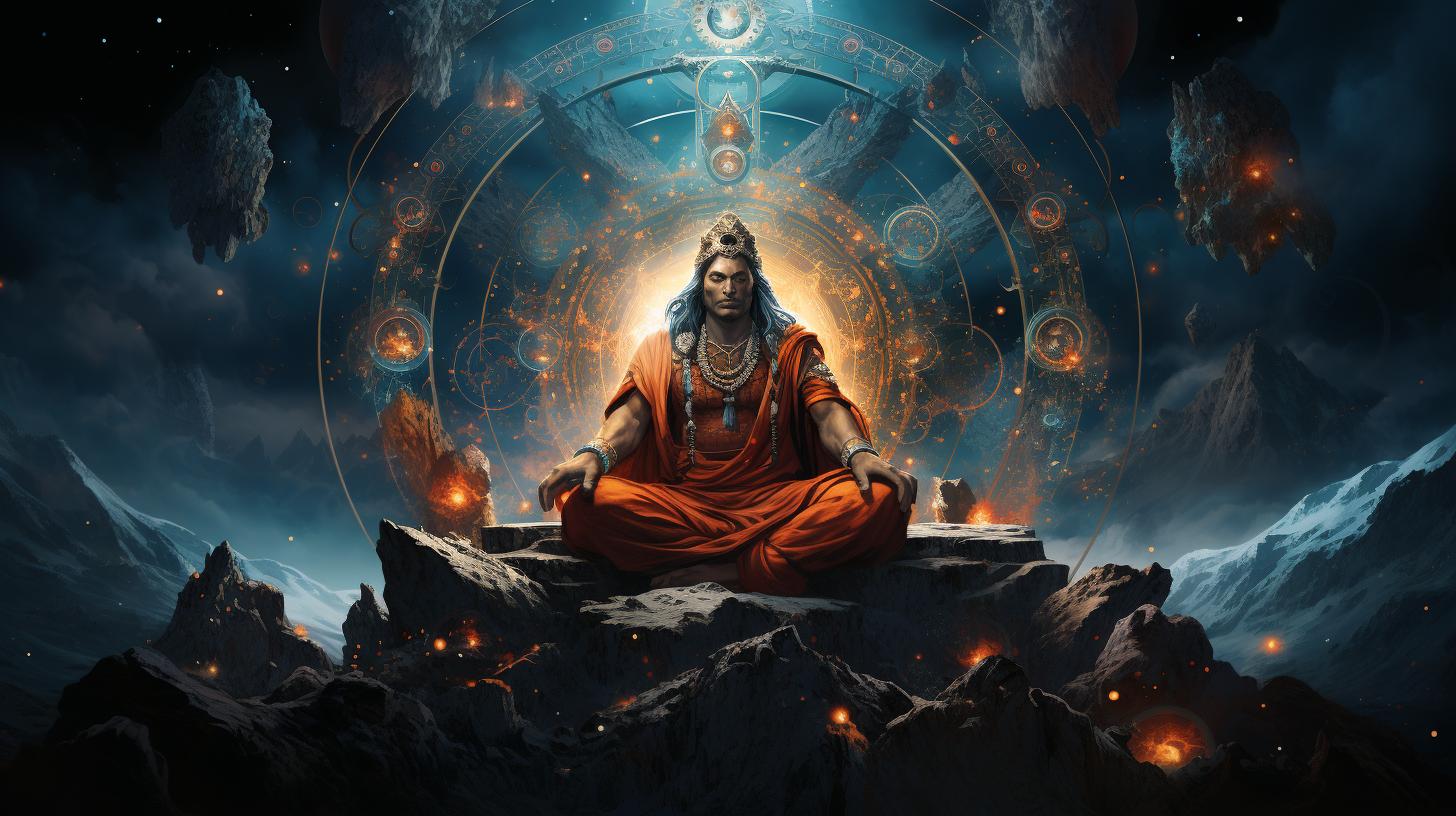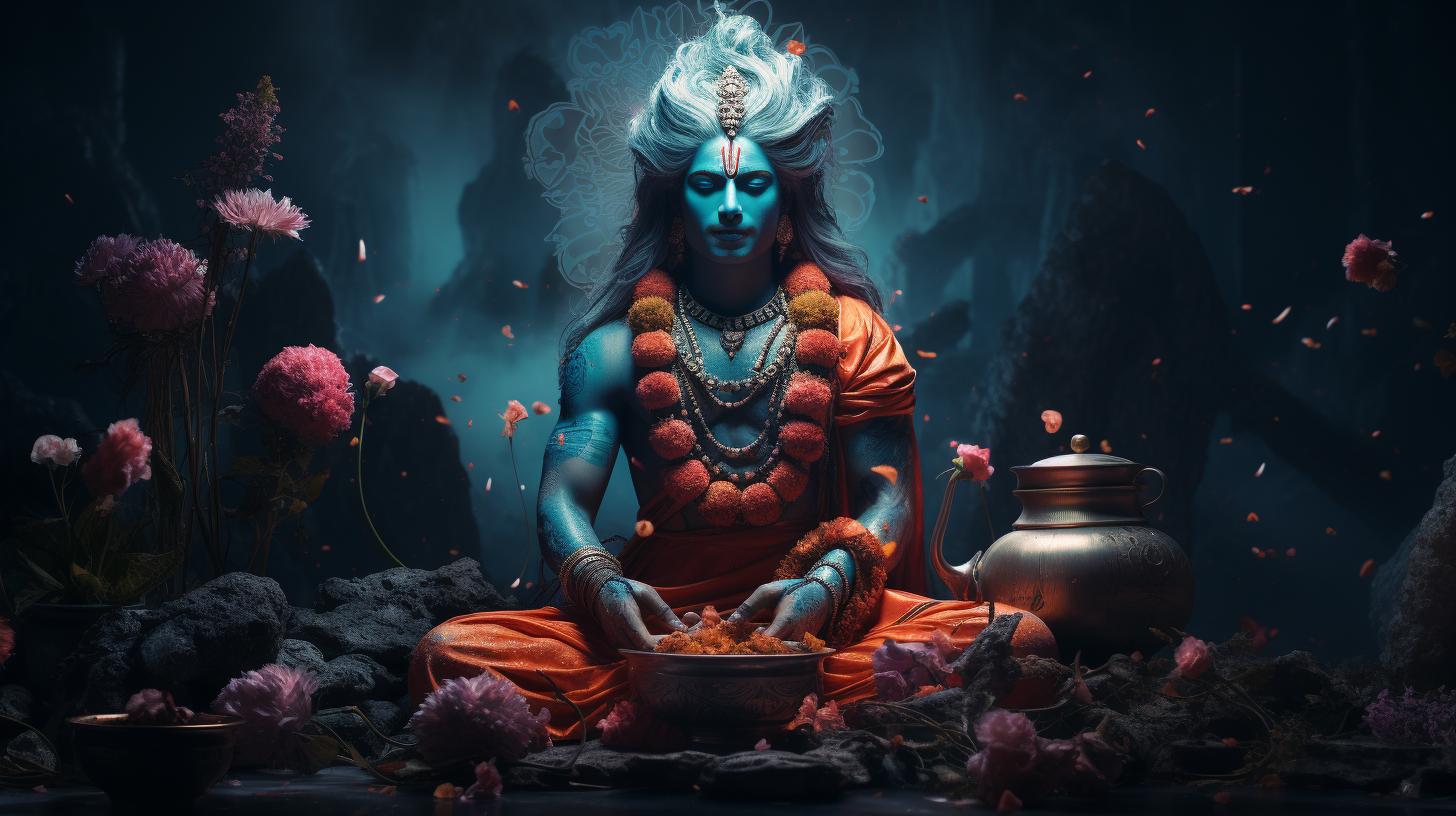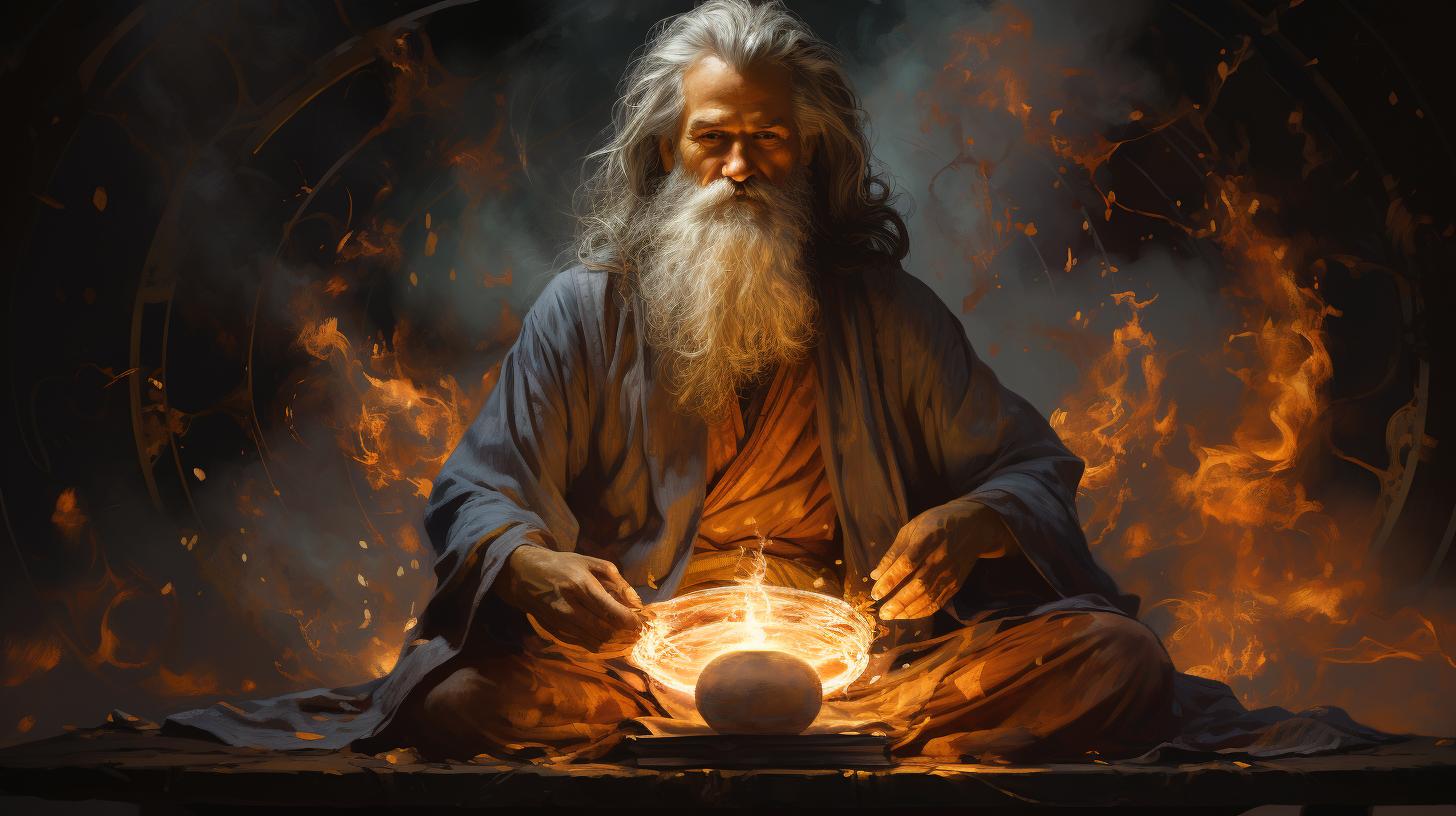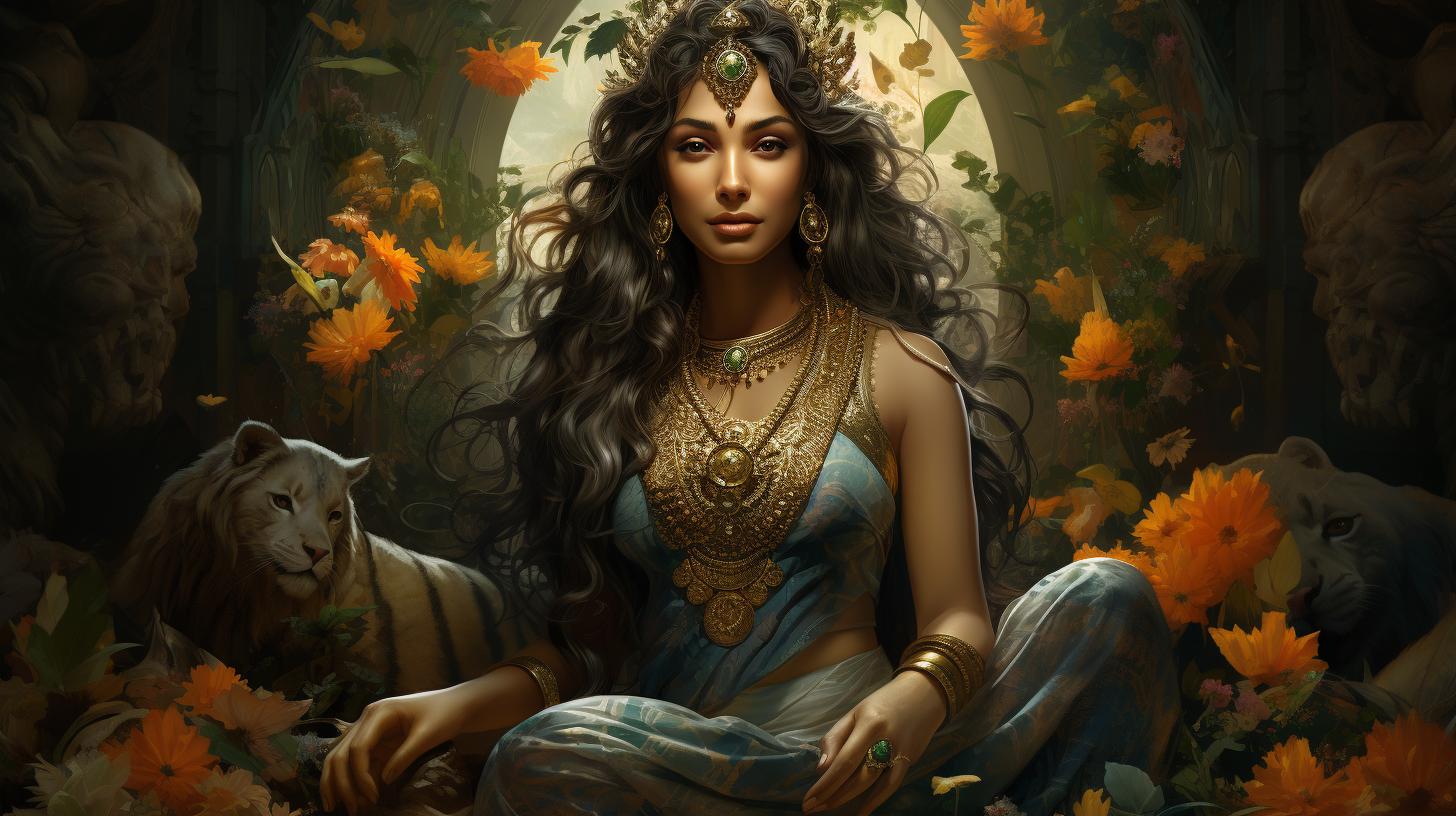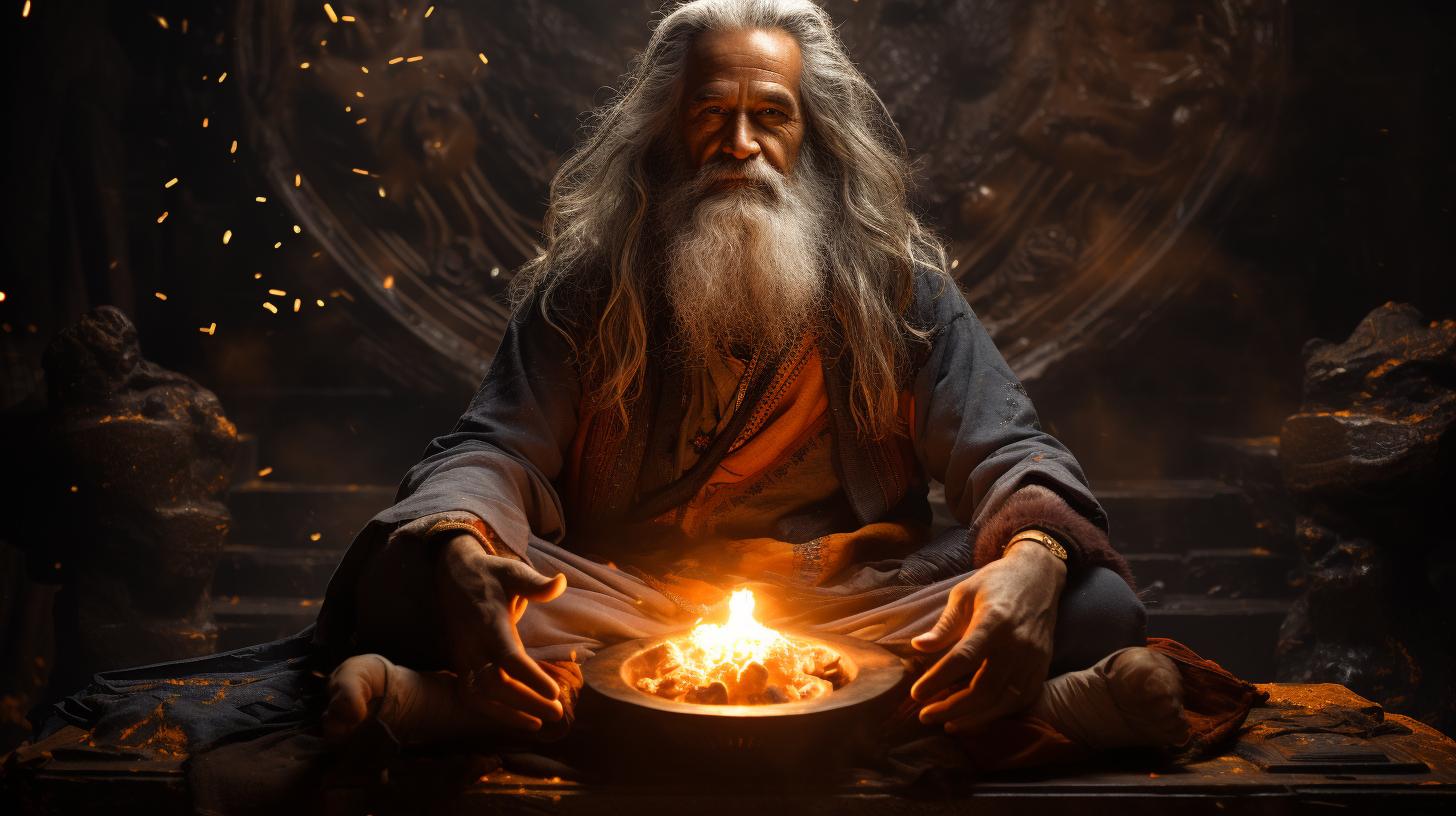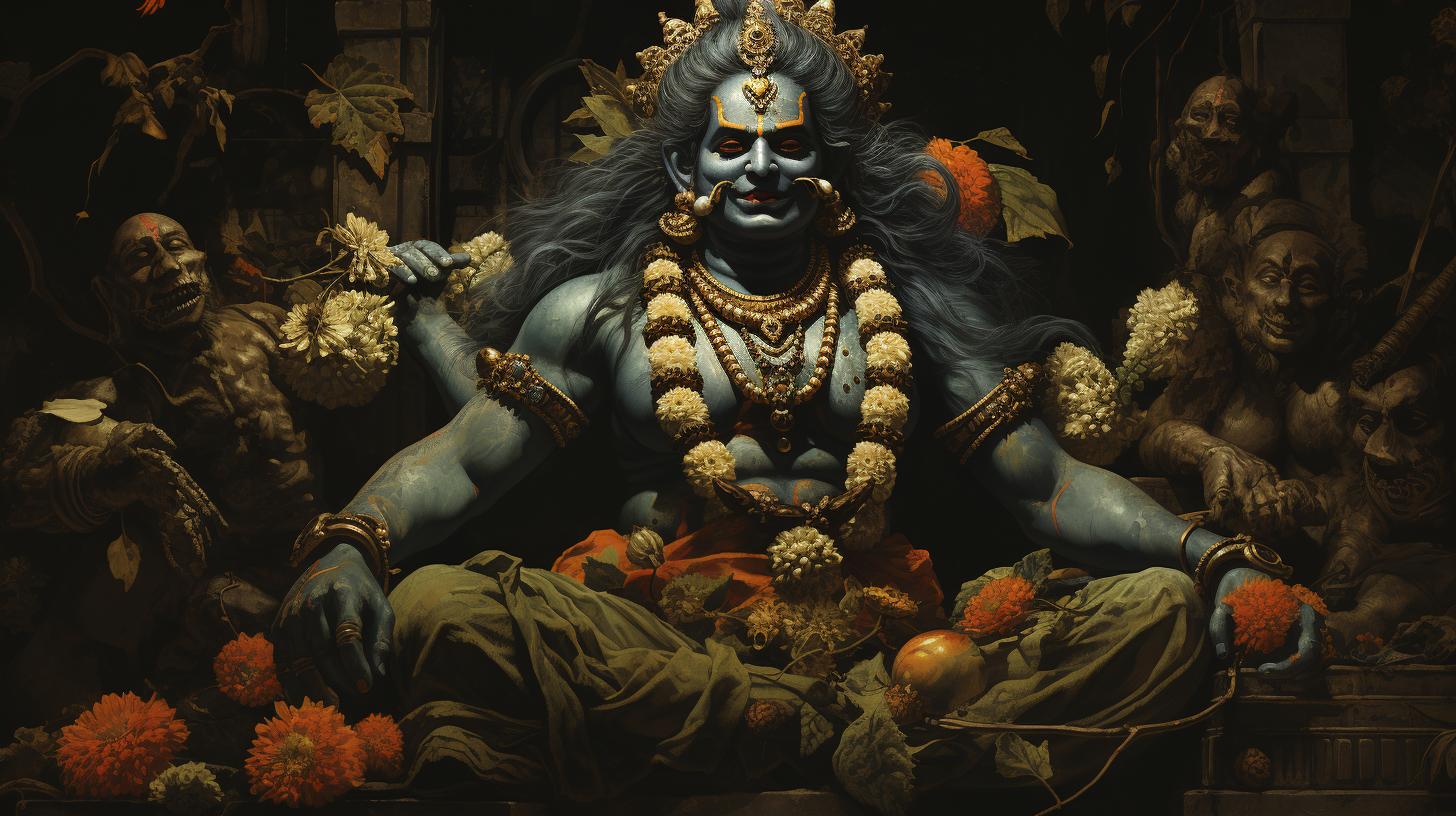The Enchanting Tale of Ushas: Goddess of Dawn in Hindu Mythology
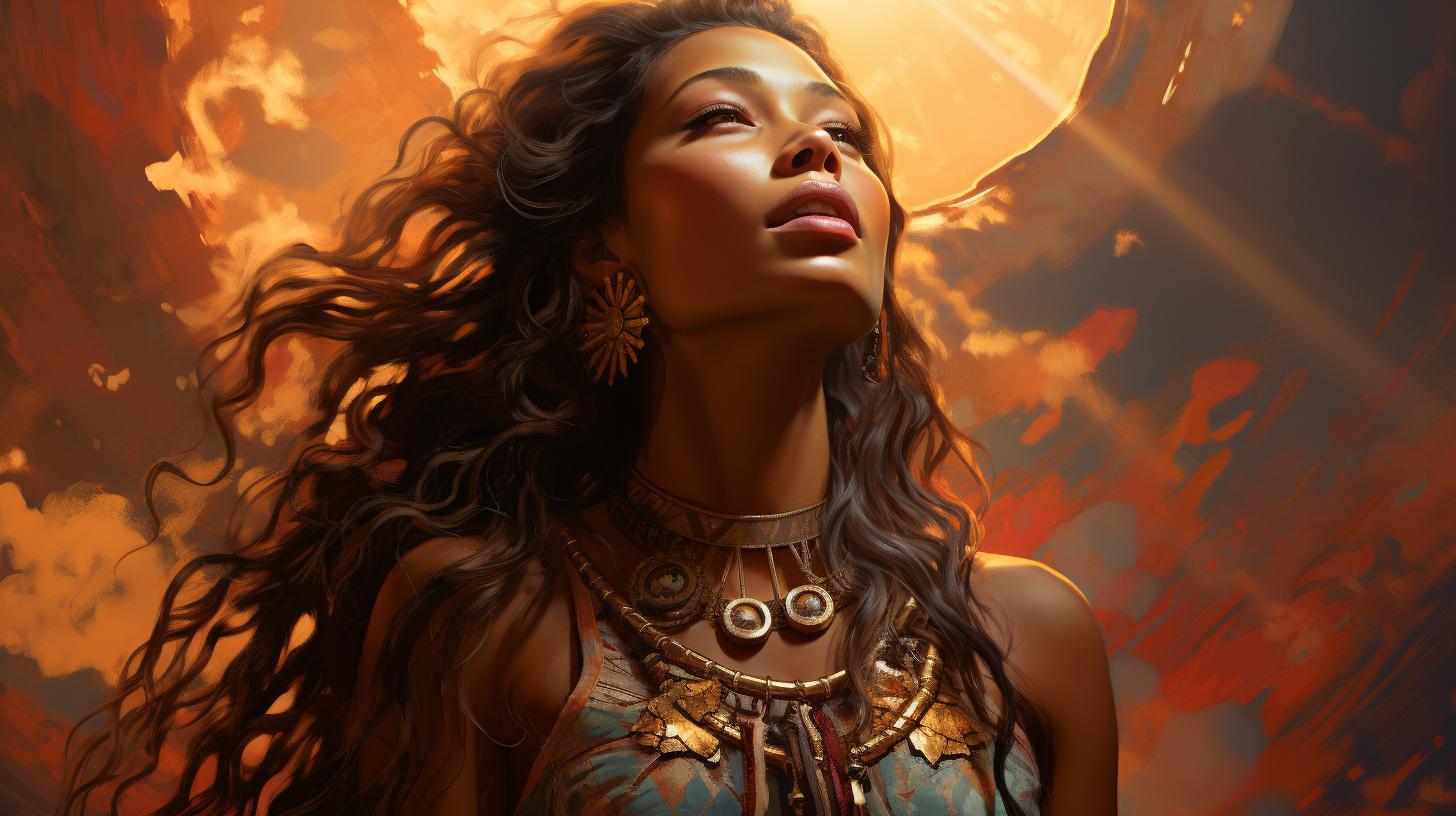
Ushas, the Hindu goddess of dawn, emerges from the ancient Vedas as a radiant emblem of new beginnings and the herald of light. Celebrated across cultures, she embodies the eternal cycle of renewal, casting away the darkness to welcome the dawn.
This exploration delves into her rich tapestry of stories, symbols, and significance, reflecting on her profound impact in the realm of spirituality and beyond, including the resonance of her divine narrative in American cultural engagement with Hinduism.
Ushas: The Hindu Goddess of Dawn
The Origins and Significance of Ushas
Tracing her lineage to the bedrock of Indo-European tradition, Ushas, revered as the goddess of dawn, stands as a testament to the universal human experience of greeting the day. Her narrative, richly woven into the Vedic texts, positions her as a symbol of hope and the promise of renewal.
As dawn breaks, Ushas, the harbinger of light, orchestrates the world’s awakening, her story unfolding in the sacred verses of Hindu lore.
Ushas in Hindu Mythology and Vedic Texts
In the mosaic of Hindu mythology, Ushas’s presence is luminous, her essence captured in the hymns of the Rigveda. She is the celestial artist, painting the sky with the first light, her story a testament to the dawn of consciousness and the cyclical nature of existence.
This divine narrative extends through the epic tapestries of the Ramayana and Mahabharata, where her symbolic significance is further amplified, connecting her to the pantheon of gods and the fabric of moral order.
Ushas in the Rigveda: Hymns and Descriptions
The Rigveda, a cornerstone of Vedic literature, celebrates Ushas through hymns that exalt her grace, vitality, and divine purpose. She is depicted as a youthful goddess, her chariot alight with the golden glow of dawn, driven by the robust vitality of her steeds.
This imagery, rich in symbolic depth, showcases her as a figure of inspiration and renewal, her name synonymous with the awakening of life.
Ushas in the Ramayana and Mahabharata
Within the revered narratives of the Ramayana and Mahabharata, Ushas’s story transcends the confines of myth, presenting her as a beacon of hope and prosperity. These texts, embodying the spiritual and cultural ethos of Hinduism, celebrate her divine role, weaving her essence into the fabric of cosmic drama and moral tales.
Symbolism and Attributes of Ushas
Her attributes, reflecting the interplay of light and darkness, underscore her role as a custodian of balance and harmony. Through her, the cycle of day and night finds meaning, each dawn a canvas for her divine play.
Ushas as the Bringer of Light and New Beginnings
As dawn’s deity, Ushas heralds the cycle of rebirth, her arrival banishing the shadow of night to herald a world reborn in light. This daily renaissance, a cornerstone of human experience, mirrors the spiritual journey from ignorance to enlightenment, Ushas guiding the way with her luminous presence.
The Role of Ushas in Cosmic Order and Divine Harmony
In the grand tapestry of Vedic mythology, Ushas’s radiance illuminates the principles of righteousness and harmony. Her essence, woven into the fabric of the universe, ensures the perpetual balance of the cosmic order, her divine light guiding the moral compass of the world.
Ushas: Associated Deities and Divine Relationship
The divine lineage of Ushas reveals her integral role in the celestial hierarchy. Daughter to the sky god Dyaus Pita, and sister to Ratri, the goddess of night, her story is a celestial symphony of light and darkness.
In her union with Surya, the sun god, and through her connections with deities like Indra and Soma, Ushas embodies the interconnectedness of the divine realm, her narrative a reflection of the intricate web of Vedic cosmology.
Ushas as the Daughter of Dyaus Pita and Sister of Ratri
Ushas, cherished daughter of Dyaus Pita and sibling to Ratri, epitomizes the cyclic nature of time and existence. This divine familial bond, etched in the annals of Hindu mythology, elevates her status, casting her as a pivotal figure in the orchestration of cosmic events and the daily ritual of dawn.
Ushas as the Wife or Mother of Surya, and Her Association with Other Deities
In certain narratives, Ushas is revered not only as the wife or mother of Surya, the sun god, but also as a figure deeply intertwined with other prominent deities such as Agni, Soma, and Indra. This sacred network amplifies her significance in the Vedic pantheon, positioning her as a pivotal figure who brings forth the sun’s radiant light and illuminates the world with the daily promise of dawn.
Ushas in Hindu Worship and Rituals
She is honored as a goddess who not only heralds the dawn but also fosters spiritual enlightenment and inner awakening among her devotees.
Ushas in Vedic Sacrificial Rituals
In the rich tapestry of Vedic sacrificial rituals, Ushas is invoked alongside other male deities named Agni (the fire god), Soma (the god of the ritual drink), and Indra (the god of thunder and rain), to bless and sanctify the proceedings.
Her presence, integral to the success of these rituals, enhances their spiritual significance and ensures a harmonious cosmic balance.
Festivals and Observances Dedicated to Ushas
Various festivals and observances dedicated to Ushas, the dawn goddess, punctuate the Hindu calendar year. These celebrations are vibrant expressions of reverence, seeking her blessings and fostering a deep, spiritual connection with her divine essence.
Ushas in Yoga and Meditation Practices
The divine qualities and symbolism of Ushas are intricately woven into the fabric of yoga and meditation practices. Practitioners invoke her energy to cultivate inner illumination, spiritual awakening, and a profound connection with the cosmic forces, embracing the promise of renewal that each new dawn brings.
Ushas: Relevance and Influence in Contemporary American Culture
The influence of Ushas transcends geographical and cultural boundaries, finding a resonant echo within contemporary American culture. Her depiction, rich in symbolism, permeates various forms of artistic expression, literature, and the burgeoning practice of Hinduism among the diverse communities in the United States, signifying her universal appeal and enduring legacy.
The Symbolic Representation of Ushas in Vedic Hymns
Ushas, the Hindu goddess of dawn, is celebrated in Vedic hymns for her symbolic representation of renewal, hope, and the eternal cycle of life. These hymns, filled with rich imagery and deep reverence, portray her as the initial spark of creation, the first light that heralds the dawn of consciousness and the continuum of time.
Ushas as a Representation of the Dawn and the Beginning of Time
In the numerous hymns dedicated to her, Ushas is exalted as a powerful manifestation of the dawn, representing the cosmic cycle and the eternal renewal of life. She emerges from the darkness as the harbinger of time itself, her presence a constant reminder of the cyclical nature of existence and the perpetual opportunity for renewal and growth.
The Imagery and Descriptions of Ushas in Vedic Hymns
The Vedic hymns abound with rich descriptions of Ushas, portraying her as a radiant and adorned young woman, embodying the dawn’s resplendent glow. Riding in her golden chariot, pulled by a hundred horses, Ushas symbolizes the unstoppable force of life and the majestic arrival of the new day.
This imagery not only highlights her divine attributes but also her role as a source of inspiration and hope for all who seek her blessings.
Ushas as a Source of Inspiration and Hope in Hymnal Devotion
Ushas’ representation in Vedic hymns serves as a profound source of inspiration and hope, uplifting the hearts of devotees with the promise of new beginnings.
Her hymns are a testament to her divine grace, reminding us of the light that follows darkness and the potential for rebirth inherent in every soul. Through hymnal devotion, Ushas instills optimism, encouraging individuals to embrace each new day with a sense of purpose and the opportunity for spiritual renewal.
The Role of Ushas in Cosmic Harmony and Moral Order
Ushas, the Hindu goddess of dawn, celebrated as a proto-Indo European deity, plays a significant role in maintaining cosmic harmony and moral order. As a prominent goddess, she is revered as a catalyst for balance and harmony within the universe, driving away oppressive darkness and chasing away evil.
Ushas as a Catalyst for Cosmic Balance and Harmony
Ushas’ divine presence brings forth the dawn, beautifully adorned young goddess signaling the transition from darkness to light. Through her radiant energy, she infuses the world with balance and harmony. Ushas’ arrival symbolizes the awakening of cosmic forces and the restoration of equilibrium, embodying the spirit of renewal and rejuvenation.
Her role as a catalyst for cosmic balance and harmony is reflected in its hymns, where she is praised for dispelling darkness and nurturing the natural order of the universe alongside deities named Agni, Soma, and Indra.
Ushas’ Influence on Human Actions and Ethical Principles
Beyond her impact on the cosmic realm, Ushas also exerts a profound influence on human actions and ethical principles.
As the goddess of dawn, she encourages individuals to embrace the light of truth and righteousness, guiding them away from actions that may lead people off the path of dharma (moral law).
Ushas’ presence inspires humans to act in accordance with moral values and maintain ethical conduct. Her divine influence guides individuals towards leading a life aligned with cosmic harmony and upholding principles that foster well-being for all.
- She instills a sense of responsibility and accountability in individuals, urging them to make choices that contribute to the greater good.
- Ushas promotes compassion, empathy, and respect for all living beings, reinforcing the interconnectedness of humanity with nature.
- Her influence encourages individuals to seek truth, pursue knowledge, and engage in self-reflection for personal growth and spiritual development.
- Ushas’ presence serves as a reminder that our actions have consequences, emphasizing the importance of practicing mindful decision-making.
By embodying these values and principles, individuals contribute to the maintenance of cosmic harmony and moral order in both their personal lives and the broader society.
Ushas: The Divine Feminine and Empowerment
The goddess Ushas embodies the divine feminine and represents a powerful force of empowerment in Hindu mythology. As an Indo-European goddess, she is revered as a symbol of feminine strength, resilience, and liberation.
Ushas inspires women to embrace their inherent power and rise above societal limitations, becoming agents of change.
Ushas as a Symbol of Feminine Power and Empowerment
Ushas is celebrated as a beacon of feminine power, her dawn light symbolizing the inner strength, beauty, and grace that reside within every woman. Her radiance encourages women to embrace their uniqueness and life-giving abilities, empowering them to express themselves freely and fearlessly in a society that often suppresses their voices.
Ushas’ Role in the Liberation and Empowerment of Women
Ushas serves as a guiding light for the liberation and empowerment of women. Her presence in Hindu mythology, alongside deities like Savitri and Surya, highlights the importance of equality and the need to challenge patriarchal norms.
Ushas encourages women to break free from societal constraints, empowering them to pursue their dreams and aspirations.
- Ushas inspires women to embrace their strengths, talents, and passions, encouraging them to strive for success in all aspects of life.
- She advocates for gender equality and challenges the prevailing gender stereotypes that limit women’s potential.
- Ushas promotes self-love, self-acceptance, and self-care among women, reminding them of their inherent worth and value.
- She provides solace and support to women facing adversity, reminding them of their resilience and ability to overcome challenges.
Ushas’ message of empowerment resonates with women across cultures, her divine presence serving as a source of inspiration and encouragement, reminding women of their inherent power and the limitless possibilities that lie before them.
Ushas’ enigmatic symbolism and her role in the liberation and empowerment of women continue to inspire and uplift individuals, transcending time and geographical boundaries.
Her message of feminine power and empowerment remains relevant, guiding women on a path of self-discovery, growth, and societal transformation.
Ushas: The Connection Between the Divine and the Human
Ushas as a Bridge Between Mortal and Immortal Realms
Ushas, revered as the goddess of dawn Hindu mythology, serves as a profound link between the mortal and immortal realms. She embodies the intermediary state between darkness and light, symbolizing the transition from night to day.
As Usha, the goddess of dawn, her role transcends mere illumination; she embodies the liminal space where divine and human realms intersect. This concept emphasizes the potential for spiritual transformation and the awakening of higher consciousness that occurs with the dawn’s light.
Ushas’ Influence on Human Life and Spiritual Pursuits
As a central figure in Hindu spiritual life, Ushas exercises a profound influence on human life and spiritual endeavors. Her arrival at dawn, breaking away the veil of night, signifies the beginning of a new day, offering a fresh start and an opportunity for growth and renewal.
Ushas’ radiant presence inspires individuals to embark on their personal journeys of self-discovery and spiritual evolution. Associated with the awakening of inner wisdom and the pursuit of enlightenment, Ushas, or Usha, the Hindu goddess, encourages alignment with her transformative energy for spiritual awakening and self-realization.
- Ushas encourages individuals to embrace the awakening of consciousness and the pursuit of knowledge.
- Her story, deeply rooted in Vedic and epic narratives like the Ramayana and Mahabharata, inspires devotees to embark on a spiritual path and seek higher truths.
- As a symbol of enlightenment, her influence extends to various spiritual practices, including meditation, yoga, and self-reflection, embodying the essence of renewal and rebirth.
- She reminds individuals of the impermanence of darkness and the continuous cycle of renewal in life, serving as a beacon of hope and rebirth.
The Essence of Ushas’ Influence
Ushas’ influence on human life lies in her ability to ignite a sense of hope, purpose, and divine connection within each individual.
Through her representation as the goddess of dawn, she encourages humanity to embrace the potential for growth, enlightenment, and spiritual transformation. Ushas symbolizes the unending cycle of life and reaffirms the interconnectedness between the divine and human realms, her divine light guiding individuals toward a deeper understanding and connection with the cosmos.
By understanding and aligning with the essence of Ushas’ influence, individuals can find inspiration to live with intention, embrace personal growth, and seek a deeper connection with the divine, illuminating the path towards a harmonious balance between the physical and spiritual realms.
Ushas and the Continuity of Life
Ushas, the Hindu goddess of dawn, revered across cultures for her role in the cycle of life and rebirth, represents the eternal and cyclical nature of existence, embodying the constant process of creation and renewal.
Her presence in the Vedas as a goddess of significant stature underscores her role in the cosmic cycle of life, death, and rebirth.
Ushas’ Role in the Cycle of Life and Rebirth
As the bringer of light and new beginnings, Ushas symbolizes the birth of each day and the opportunity for growth and transformation.
Just as the day emerges from the darkness of night, Ushas, the vedic goddess, represents the continuous cycle of life, death, and rebirth. Her divine presence reminds us that life is an ongoing journey, filled with endless possibilities and chances for renewal.
Ushas’ connection to the proto-Indo-European deity traditions reinforces her timeless significance and her role in maintaining the cosmic balance.
Ushas’ association with the cycle of life and rebirth extends beyond individual existence to encompass the entire cosmic order.
She ensures the perpetuation of life, maintaining the balance between creation and destruction, and embracing the inevitability of change. Her presence in rituals and prayers signifies the embrace of transformation and the acceptance of the cyclical nature of life, her divine wisdom guiding the faithful through the transitions of existence.
Ushas’ Connection to Fertility and the Nurturing of Life
Alongside her role in the cycle of life and rebirth, Ushas is also closely tied to fertility and the nurturing of life. Often depicted as a mother figure, she embodies the nurturing and life-giving qualities associated with motherhood.
Ushas’ divine energy infuses the world with vitality and abundance, ensuring the continuity of life in all its forms. Her connection to fertility is particularly evident in agricultural practices, where she is revered as the provider of bountiful harvests and the sustainer of life.
Ushas’ nurturing presence fosters growth and prosperity, her blessings sought by those who till the earth and sow the seeds of tomorrow. This connection underscores the universal theme of fertility and rebirth, celebrating Ushas as a goddess who not only heralds the dawn but also ensures the flourishing of life across the world.
Ushas’ focus on continuity and nurturing aligns seamlessly with the universal values of perseverance and the belief in the potential for growth and renewal. Her symbolism serves as a timeless reminder that life is an ever-evolving journey, offering us the opportunity to learn, adapt, and thrive, her story a testament to the enduring spirit of creation and the endless cycle of life.
The Devotional Practices and Rituals Associated with Ushas
Devotion to Ushas, the Hindu goddess of dawn, is marked by various practices and rituals that honor her divinity and seek her blessings. These devotional offerings and ceremonies, deeply rooted in the rich tapestry of Hindu mythology and the stories of Ushas, play an integral role in the worship of Ushas, allowing devotees to connect with her spiritual energy and express their gratitude.
Ushas’ Invocation and Pujas: Devotional Offerings
Devotees invoke Ushas’ presence through prayers, chants, and mantras, celebrating her as the embodiment of the dawn’s light and the harbinger of new beginnings. They offer flowers, incense, and lamps as a sign of devotion and gratitude.
Pujas, or formal worship rituals, are conducted in temples or homes, during which Ushas’ image or idol is adorned with beautiful clothing, jewelry, and fragrant flowers, reflective of her status as a divine symbol of awakening and renewal.
- Prayers and mantras are recited to invoke Ushas’ blessings and protection, often incorporating her story and symbols into the ritual.
- Flowers, incense, and lamps are offered as gestures of devotion, symbolizing the light of dawn she brings.
- Pujas involve adorning Ushas’ image with clothing, jewelry, and flowers, embodying her attributes and significance as a goddess of light and wisdom.
- Offerings like fruits and sweets symbolize devotion and abundance, reflecting the prosperity that Ushas is believed to bring.
Ushas in Chhath Puja: Celebrating the Power of the Sun
Chhath Puja, a festival that venerates Ushas and the sun god Surya, demonstrates the profound reverence for Ushas within Hindu traditions.
This celebration, deeply intertwined with the stories of Ushas and her divine counterparts such as Soma and Indra, illustrates the communal and personal significance of honoring the goddess of dawn.
Devotees fast and observe rigorous rituals near rivers, lakes, or other bodies of water, expressing their devotion and seeking blessings for prosperity and well-being.
- Chhath Puja typically takes place in October or November, aligning with the cyclical nature of time and the celestial dance of light and darkness, themes central to Ushas’ mythology.
- Devotees observe a strict fast and perform rituals near water bodies, echoing the purifying and life-sustaining qualities attributed to Ushas.
- Offerings are made to the setting and rising sun, seeking Ushas’ blessings for health, prosperity, and spiritual growth.
- Prayers, songs, and folk dances are performed during the festivities, celebrating the cultural heritage and spiritual messages of Ushas’ teachings.
Through these devotional practices and rituals, devotees seek to establish a personal connection with Ushas, seeking her divine grace, abundance, and enlightenment.
The reverence for Ushas is not only integral to Hindu worship but also serves as a means to reflect on the values of hope, new beginnings, and the continuity of life.
Ushas’ Impact on Personal Growth and Spiritual Enlightenment
Ushas, the Hindu goddess of dawn, holds profound significance in the realm of personal growth and spiritual enlightenment. Through the teachings and lessons associated with Ushas, individuals are inspired to embark on a transformative journey towards self-discovery and inner awakening.
Ushas’ Teachings and Lessons for Personal Transformation
Ushas’ teachings encompass various aspects that contribute to personal transformation. Her role as the bringer of light and new beginnings, combined with her association with cosmic order and divine harmony, serves as a powerful reminder of the importance of embracing change and leaving behind the darkness of the past.
Furthermore, Ushas’ association with the natural cycle of day and night, and her invocation in the sacred texts of Ramayana and Mahabharata, guides individuals towards leading a life aligned with moral principles.
Her influence inspires ethical behavior, compassion, and the pursuit of righteousness, teaching the significance of living in harmony with ourselves, others, and the universe.
Ushas’ Association with Spiritual Awakening and Enlightenment
Ushas symbolizes the connection between the divine and the human, acting as a bridge to spiritual awakening and enlightenment.
By invoking Ushas and seeking her guidance, individuals can cultivate a deeper spiritual connection and embark on an inward journey of self-realization.
Her radiant presence serves as a reminder of the inherent divinity within us all.
Through practices such as yoga, meditation, and devotion, one can tap into Ushas’ transformative energy, leading to spiritual enlightenment and a deeper understanding of the self and the universe.
In the contemporary American context, individuals who resonate with Ushas’ teachings and symbolism can incorporate her principles into their spiritual practices, seeking personal growth, inner peace, and a heightened sense of spiritual awareness.
.
.












